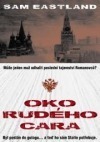Take a photo of a barcode or cover
adventurous
challenging
dark
informative
tense
medium-paced
Plot or Character Driven:
A mix
Strong character development:
No
Loveable characters:
Yes
Diverse cast of characters:
No
Flaws of characters a main focus:
No
I would love to give this book a higher rating, and initially I did give it 3 stars, but ultimately, I shaved off a star when, after serious consideration, I realized that a good part of my liking for this book stems from the fact that it centers on an actual investigation into the murders of the family of Tsar Nicholas II and his family, not on account of the story itself (I believe another reviewer on GR came to a similar conclusion). While the overall story is decent, it lacked any true punch, nor was it overly engaging on its own merits.
I did like the principle character, Inspector Pekkala, I will say that. He is a very interesting character, and I enjoyed seeing his story unfold, both in the present thread and in the flashbacks. Still, I did find some of his reactions a bit… off. For one, I’m very curious as to how he could bring himself to work for the man who tortured him? Granted, Pekkala’s plans to go look for his former fiancé have just gone up in smoke (and I totally think that Stalin was stretching the truth about the lady having moved on, given how eager he is to keep Pekkala in the Soviet Union and on staff), but he’s sitting in the presence of the man who ordered his brutalization. I’d find it more believable if Pekkala turned down the offer, made plans to go visit his parents (provided they are still alive), and then proceeded to get as far away from Russia as possible, particularly given his close relationship with Tsar Nicholas and Alexei. While in this story, the Bolsheviks are not responsible for the deaths of the Tsar and his family, but it still seems odd that Pekkala would want to work for the ones who deposed the Tsar, whom Pekkala was very close to and respected.
Then there is the whole mystery itself – the question of who murdered the Romanovs. This book first came out in 2010, a few years after the last two bodies of the Romanovs were found in the forests outside of Yekaterinburg, Alexei and one of his sisters (Marie according to Russian authorities, Anastasia to those outside of Russia). By that point, the story of the Romanovs’ end and how they came to be buried was very well known. Little attention was paid to historical fact in this story. The Romanovs end up down a mineshaft and are left there to mummify there until Pekkala finds them instead of what truly happened to them – go into a mineshaft, come out of a mineshaft, a couple of bodies get separated from the rest, and everyone gets buried, left to rot for nearly a century until the Soviet Union collapses and it’s safe to actually talk about the Romanovs without risking getting shot for it. What’s more, the four attendants that historically stayed with the Romanovs to the end were completely removed from the story. While that was likely done for simplicity’s stake, it still feels like an enormous oversight. These four people chose to stay despite likely having opportunities to leave and save themselves. And yet, more often than not, they are completely cut out of any adaptation of the Romanovs’ story.
In the end, it was really difficult to become overly invested in the story as a whole. The mystery was decent, though I put the pieces together pretty fast and well before the grand reveal at the climax of the novel. I had ‘Alexei’ pegged for a fake pretty fast – the real Alexei was a sheltered boy of incredibly fragile health, and yet we’re expected to believe that he not only survived the horrendous murder of his family, but was able to sink into hiding and blend in all around the world while he traveled? Yeah, pull the other one, it’s got bells on it.
I think I may go ahead and keep going with this series, though, simply because Pekkala himself has caught my interest. I’d like to see what else he has in store, and just how things will continue from here on out. WWII is just about a decade away, and that will mean big things for the characters.
I did like the principle character, Inspector Pekkala, I will say that. He is a very interesting character, and I enjoyed seeing his story unfold, both in the present thread and in the flashbacks. Still, I did find some of his reactions a bit… off. For one, I’m very curious as to how he could bring himself to work for the man who tortured him? Granted, Pekkala’s plans to go look for his former fiancé have just gone up in smoke (and I totally think that Stalin was stretching the truth about the lady having moved on, given how eager he is to keep Pekkala in the Soviet Union and on staff), but he’s sitting in the presence of the man who ordered his brutalization. I’d find it more believable if Pekkala turned down the offer, made plans to go visit his parents (provided they are still alive), and then proceeded to get as far away from Russia as possible, particularly given his close relationship with Tsar Nicholas and Alexei. While in this story, the Bolsheviks are not responsible for the deaths of the Tsar and his family, but it still seems odd that Pekkala would want to work for the ones who deposed the Tsar, whom Pekkala was very close to and respected.
Then there is the whole mystery itself – the question of who murdered the Romanovs. This book first came out in 2010, a few years after the last two bodies of the Romanovs were found in the forests outside of Yekaterinburg, Alexei and one of his sisters (Marie according to Russian authorities, Anastasia to those outside of Russia). By that point, the story of the Romanovs’ end and how they came to be buried was very well known. Little attention was paid to historical fact in this story. The Romanovs end up down a mineshaft and are left there to mummify there until Pekkala finds them instead of what truly happened to them – go into a mineshaft, come out of a mineshaft, a couple of bodies get separated from the rest, and everyone gets buried, left to rot for nearly a century until the Soviet Union collapses and it’s safe to actually talk about the Romanovs without risking getting shot for it. What’s more, the four attendants that historically stayed with the Romanovs to the end were completely removed from the story. While that was likely done for simplicity’s stake, it still feels like an enormous oversight. These four people chose to stay despite likely having opportunities to leave and save themselves. And yet, more often than not, they are completely cut out of any adaptation of the Romanovs’ story.
In the end, it was really difficult to become overly invested in the story as a whole. The mystery was decent, though I put the pieces together pretty fast and well before the grand reveal at the climax of the novel. I had ‘Alexei’ pegged for a fake pretty fast – the real Alexei was a sheltered boy of incredibly fragile health, and yet we’re expected to believe that he not only survived the horrendous murder of his family, but was able to sink into hiding and blend in all around the world while he traveled? Yeah, pull the other one, it’s got bells on it.
I think I may go ahead and keep going with this series, though, simply because Pekkala himself has caught my interest. I’d like to see what else he has in store, and just how things will continue from here on out. WWII is just about a decade away, and that will mean big things for the characters.
Sam Eastland’s thriller historical novel kept me fascinated. Pekkala is Czar Nicholas Romanov’s personal investigator, The Emerald Eye. Imprisoned in Siberia after the Bolshevik Revolution, he is eventually freed by Stalin to determine who assassinated the Czar and his family. Do this and you’ll win your freedom, he is promised. The quest takes Pekkala on quite a journey, during which we witness some of the ravages of Stalin’s rule. Flash-back chapters provide insight into Pekkala’s personality and his unique access to the Czar and explain why Stalin offers him a future. Eastland’s attention to the historical record (for broad context) makes this an interesting foray; Stalin’s record of duplicity makes it questionable why Pekkala would trust him. The author handles motivations pretty well, however, and perhaps the closing will satisfy. I’ll have to read the forthcoming Shadow Pass, a second Pekkala novel, to see if it holds up for me. Still, a good, solid read.
Subjects in crime fiction seem to come in waves these days. Russian history seems to be one of those waves, either that or there's some weird synergy going on in my life. EYE OF THE RED TSAR is one of the Russian themed books I've been lucky enough to receive recently. Set against Russia under the rule of Stalin and all the brutality and ruthlessness that regime imposed, this is a book about the life of Pekkala. A favourite of the Tsar, Pekkala was known to be utterly loyal to his master.
Unexpectedly reprieved he is accompanied by the very new Commissar Kirov on his mission. A bitter sweet assignment for Pekkala. On the one hand, possible success and freedom; on the other, the sadness and despair he feels as he traces the last days of the family he knew, and in particular the Tsar he admired.
The fate of the Romanov's, told from the aspect of the Tsar and the entire family, rather than the more common Anastasia speculation is related as a series of current day events interspersed with flashbacks. So much of what Pekkala sees, hears and touches reminds him of the past. It's a very elaborate, textured way of telling a tale, slowly and intricately, weaving Pekkala's past life, his own background, the current investigation, the Tsar's family, Kirov and Pekkala's estranged brother.
Because Pekkala is narrating this tale the constantly outward looking perspective does mean that you feel like you understand the life that has shaped this man, but you may come away from the book not quite sure who the man has become. As this is the first book in a proposed series, that seems somehow fair enough, one would hope that in the future the character himself will step out from behind the events and into the light a little more.
Having said that, this is a gloriously Russian feeling novel. There is a sense of history, of sadness, a little hope, a lot of reflection, glory found, and more than a little glory lost. There is also, given that this is an alternate history, a timeline at the end which explains what really happened to the Romanov's. For which I, for one, was very grateful. There is such a sense of reality to EYE OF THE RED TSAR that it was very easy to get more than a little confused about facts versus fiction.
Unexpectedly reprieved he is accompanied by the very new Commissar Kirov on his mission. A bitter sweet assignment for Pekkala. On the one hand, possible success and freedom; on the other, the sadness and despair he feels as he traces the last days of the family he knew, and in particular the Tsar he admired.
The fate of the Romanov's, told from the aspect of the Tsar and the entire family, rather than the more common Anastasia speculation is related as a series of current day events interspersed with flashbacks. So much of what Pekkala sees, hears and touches reminds him of the past. It's a very elaborate, textured way of telling a tale, slowly and intricately, weaving Pekkala's past life, his own background, the current investigation, the Tsar's family, Kirov and Pekkala's estranged brother.
Because Pekkala is narrating this tale the constantly outward looking perspective does mean that you feel like you understand the life that has shaped this man, but you may come away from the book not quite sure who the man has become. As this is the first book in a proposed series, that seems somehow fair enough, one would hope that in the future the character himself will step out from behind the events and into the light a little more.
Having said that, this is a gloriously Russian feeling novel. There is a sense of history, of sadness, a little hope, a lot of reflection, glory found, and more than a little glory lost. There is also, given that this is an alternate history, a timeline at the end which explains what really happened to the Romanov's. For which I, for one, was very grateful. There is such a sense of reality to EYE OF THE RED TSAR that it was very easy to get more than a little confused about facts versus fiction.
Great historical fiction about a time and place I really did not know anything about. Very well written. I am grateful the author put in a real timeline at the end odf the book to fill me in-otherwise I would have had to do the research through Google!
mysterious
fast-paced
A great book with some really good writing and descriptions of historical events. The only issue was the ending, which was a little unbelievable.
I quite enjoyed this tale set in 1920's Russia. Inspector Pekkala is brought back from exile in Siberia to investigate the deaths of the Romanov family. When Alexei's corpse is not found with the rest of the bodies, Pekkala goes in search of him.
I really enjoyed the characters and the historical setting. The only thing that bothered me was the flashbacks being written in tiny italic print. Too old for that to be enjoyable. Not a flaw of the writing, of course, just of the printing. I look forward to reading the next in the series.
I really enjoyed the characters and the historical setting. The only thing that bothered me was the flashbacks being written in tiny italic print. Too old for that to be enjoyable. Not a flaw of the writing, of course, just of the printing. I look forward to reading the next in the series.
This was an okay book. Fun while it lasted, but nothing special. I found some actions of characters a bit unbelievable. Not that I mind that the author twisted history a bit, it's fiction after all, but I couldn't imagine doing the things and making the choices the characters did. It didn't feel logical at all.
Eye of the Red Tsar is Sam Eastland’s introductory novel. It is an entertaining mystery suspense novel set in Post Imperial Russia.
Inspector Pekkala was the Tsar’s most trusted advisor and enforcer. Prior to the revolution, he was called the “Eye of the Tsar” as Tsar Nicholas had given him the title of The Emerald Eye and declared that no one, not even the Tsar himself, was above answering to Pekkala. After the royal family was murdered at the start of the revolution however, Pekkala was tortured, imprisoned and banished to Siberia.
Pekkala is given a chance to redeem himself under Stalin. If he can discover who actually murdered the royal family and return the Tsar’s treasure to Stalin, he will end his sentence. He accepts the offer, making him the Eye of the Red Tsar (a name given to Stalin.) Through some decent mystery storytelling, Pekkala discovers the remains of the royal family, tracks down the responsible party and returns the lost treasure to Stalin. This was only possible after he decodes a secret message left for him by the Tsar.
The novel was not particularly complicated; it was simply entertaining. The author did make use of frequent flashbacks to fill in the character of Pekkala so the reader could better understand his motivations. The interesting characters and setting combined with a surprise ending made for a satisfying read. Best of all, the book ends setting the way for an entire series of Pekkala novels with his permanent reinstatement to his post by Stalin.
Inspector Pekkala was the Tsar’s most trusted advisor and enforcer. Prior to the revolution, he was called the “Eye of the Tsar” as Tsar Nicholas had given him the title of The Emerald Eye and declared that no one, not even the Tsar himself, was above answering to Pekkala. After the royal family was murdered at the start of the revolution however, Pekkala was tortured, imprisoned and banished to Siberia.
Pekkala is given a chance to redeem himself under Stalin. If he can discover who actually murdered the royal family and return the Tsar’s treasure to Stalin, he will end his sentence. He accepts the offer, making him the Eye of the Red Tsar (a name given to Stalin.) Through some decent mystery storytelling, Pekkala discovers the remains of the royal family, tracks down the responsible party and returns the lost treasure to Stalin. This was only possible after he decodes a secret message left for him by the Tsar.
The novel was not particularly complicated; it was simply entertaining. The author did make use of frequent flashbacks to fill in the character of Pekkala so the reader could better understand his motivations. The interesting characters and setting combined with a surprise ending made for a satisfying read. Best of all, the book ends setting the way for an entire series of Pekkala novels with his permanent reinstatement to his post by Stalin.



